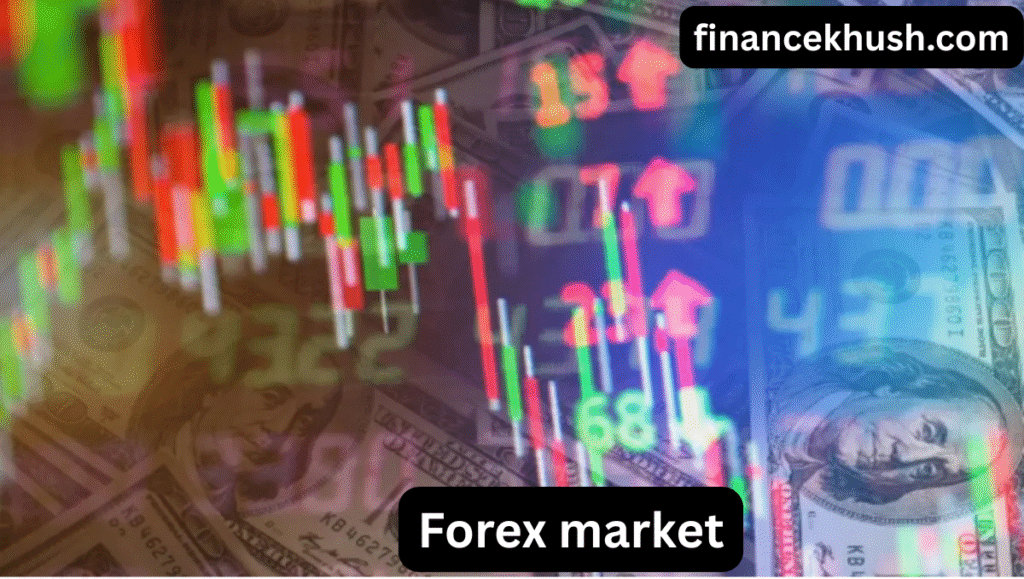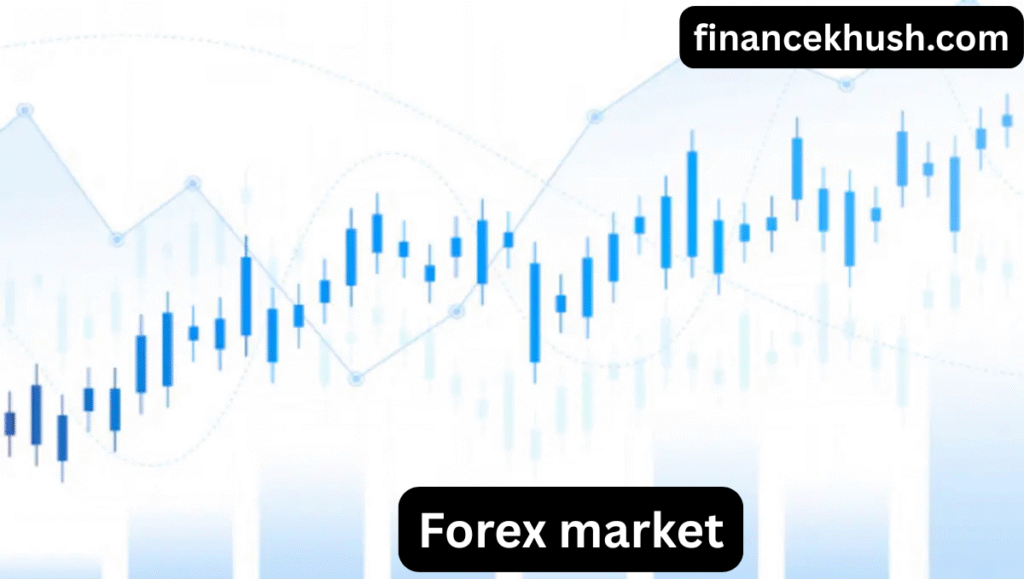The Forex market, also known as the foreign exchange market, is one of the largest and most dynamic financial markets in the world. It involves the buying and selling of currencies from all over the globe. Whether you’re an investor, a trader, or someone just curious about how it all works, this simple guide will give you a comprehensive understanding of what the Forex market is, how it functions, and why it’s so important.
What is the Forex Market?
The Forex market is where different currencies are traded against each other. This market operates 24 hours a day, five days a week, and it has no central exchange like the stock market. Instead, it is an over-the-counter (OTC) market, meaning that currency trading happens directly between parties, usually through brokers or banks.
In essence, the Forex market enables businesses, governments, and individuals to exchange one currency for another. For example, if you are a tourist traveling to Europe, you may need to exchange your local currency (such as US dollars) for euros. Similarly, businesses involved in international trade may need to convert their profits from foreign sales into their home country’s currency.
The Forex market is also highly liquid, meaning there is always a buyer and a seller. With over $6 trillion being traded daily, it’s the most liquid financial market in the world, which allows for quick transactions at any given time.
How Does Forex Trading Work?
At its core, Forex trading involves buying one currency while selling another simultaneously. Currencies are traded in currency pairs, like EUR/USD (Euro/US Dollar), GBP/USD (British Pound/US Dollar), and USD/JPY (US Dollar/Japanese Yen).
When you trade in the Forex market, you are speculating on whether the value of one currency will rise or fall relative to another. If you believe the value of the euro will rise against the dollar, you would buy the EUR/USD pair. On the other hand, if you think the value of the euro will fall, you would sell the EUR/USD pair.
For example, if you buy the EUR/USD pair at 1.2000, and the exchange rate increases to 1.2100, you could sell it at the higher rate and make a profit. Conversely, if the exchange rate drops to 1.1900, you would face a loss if you sold at that point.
Major Currency Pairs in the Forex Market
There are thousands of different currency pairs in the Forex market, but some of the most traded pairs are known as the “major pairs.” These currency pairs always include the US dollar (USD) and one other major currency. Here are a few of the most popular major currency pairs:
- EUR/USD (Euro/US Dollar): This is the most traded currency pair in the world, representing the two largest economies globally—Europe and the United States.
- GBP/USD (British Pound/US Dollar): Known as “Cable,” this pair reflects the value of the British pound relative to the US dollar.
- USD/JPY (US Dollar/Japanese Yen): This currency pair represents the US dollar against the Japanese yen, a popular choice for traders because of the yen’s liquidity.
- USD/CHF (US Dollar/Swiss Franc): Often called the “Swissie,” this pair is a safe haven for traders, especially in times of economic uncertainty.
- AUD/USD (Australian Dollar/US Dollar): This pair reflects the value of the Australian dollar against the US dollar, often influenced by commodity prices, as Australia is a major exporter of natural resources.
- USD/CAD (US Dollar/Canadian Dollar): Known as the “Loonie,” this pair reflects the value of the US dollar against the Canadian dollar, and is influenced by oil prices, since Canada is one of the world’s largest oil producers.

Types of Forex Markets
The Forex market can be categorized into three major types:
- Spot Market: The spot market is where currencies are bought and sold for immediate delivery, typically within two business days. The price at which a currency is traded in the spot market is called the “spot price.”
- Forward Market: In the forward market, participants agree to buy or sell a currency at a predetermined price on a specified future date. These contracts are customizable and not standardized.
- Futures Market: Futures contracts are similar to forwards, but they are standardized and traded on exchanges like the Chicago Mercantile Exchange (CME). These contracts have set expiration dates and are often used for hedging or speculation.
Who Participates in the Forex Market?
The Forex market isn’t just for professional traders. People from all walks of life participate in Forex trading, from large financial institutions to individual retail traders. Let’s break down some of the main players:
- Banks and Financial Institutions: These institutions are some of the biggest players in the Forex market, accounting for a significant portion of daily trading volume. They trade currencies to facilitate global transactions for businesses, governments, and investors.
- Corporations: Businesses involved in international trade often participate in the Forex market to hedge against currency fluctuations. For example, if a company in the United States imports goods from Japan, it may need to convert US dollars into Japanese yen to complete the transaction.
- Central Banks: Governments and central banks (like the Federal Reserve in the U.S. or the European Central Bank) also play a role in the Forex market. Central banks may intervene in currency markets to stabilize their own currencies or achieve specific economic goals.
- Retail Traders: Over the years, individual investors and traders have increasingly participated in Forex trading. These retail traders can trade from home using online platforms and brokers.
- Hedge Funds and Investment Managers: Hedge funds use the Forex market to hedge their investments or speculate on currency movements. These funds often have significant capital to trade large volumes in the market.
Why Do People Trade Forex?
There are several reasons why people choose to participate in the Forex market:
- Profit Potential: The Forex market is highly liquid and volatile, which means there is potential for traders to make a profit from even small price movements. With leverage, traders can amplify their profits (although it also increases risk).
- 24/5 Trading: The Forex market is open 24 hours a day, five days a week, which allows traders to buy and sell currencies at any time. This flexibility is appealing to traders who prefer to trade during specific hours or from different time zones.
- Diverse Trading Opportunities: Because there are many different currency pairs to choose from, traders have a variety of opportunities. They can trade major pairs, minor pairs, or exotic pairs based on their strategies and preferences.
- Leverage: Forex brokers often offer leverage, allowing traders to control large positions with a smaller amount of capital. While leverage can increase potential profits, it also carries a higher risk.
- Hedging: Businesses and investors use the Forex market to hedge against currency risk. For example, a US-based company that exports goods to Europe may hedge against the risk of the euro depreciating by entering into a Forex contract.
Risks of Trading in the Forex Market
While the Forex market offers many opportunities, it also comes with its risks. Some of the key risks include:
- Leverage Risk: While leverage can amplify gains, it can also magnify losses. A small change in currency prices can lead to significant losses if leverage is used improperly.
- Market Volatility: Currency prices can fluctuate rapidly due to economic news, geopolitical events, or natural disasters. This volatility can lead to both significant profits and losses in a short period of time.
- Lack of Regulation: The Forex market is largely decentralized and less regulated than other financial markets. As a result, some brokers may not be trustworthy, and traders should do their due diligence before choosing a broker.
- Emotional Trading: Forex trading can be emotionally taxing, especially during periods of high volatility. Traders may make impulsive decisions based on fear or greed, which can lead to significant losses.
How to Start Trading in the Forex Market
If you’re interested in starting Forex trading, here are some simple steps to help you get started:
- Learn the Basics: Before you start trading, take the time to learn about the Forex market, different currency pairs, and basic trading strategies. There are many resources available online, including tutorials, webinars, and courses.
- Choose a Reliable Broker: Choose a reputable Forex broker that offers a user-friendly platform, competitive spreads, and good customer support. Make sure they are regulated by a financial authority to ensure safety and security.
- Start with a Demo Account: Most Forex brokers offer demo accounts where you can practice trading without risking real money. This is an excellent way to get a feel for the platform and test out your strategies.
- Develop a Trading Plan: Having a clear trading plan is crucial for success in Forex trading. Your plan should include your risk tolerance, trading goals, and strategies. Stick to your plan and avoid emotional decision-making.
- Start Small and Manage Risk: When you’re ready to trade with real money, start small. Use proper risk management techniques, such as setting stop-loss orders and only risking a small percentage of your capital on each trade.

Conclusion
The Forex market is an exciting and dynamic arena for those looking to invest, trade, or simply learn more about how currencies are exchanged. By understanding the basics of Forex trading, the participants involved, and the risks and rewards, you can make more informed decisions in this vast and constantly evolving market. Whether you’re a beginner or a seasoned pro, the Forex market offers countless opportunities to those willing to learn and take calculated risks. Happy
Related post
Faq’s
1. What is the Forex market?
The Forex market (short for “foreign exchange market”) is a global marketplace where currencies are bought and sold. It is the largest financial market in the world, where people, companies, and governments exchange currencies like the US dollar, euro, and yen.
2. How does Forex trading work?
Forex trading involves buying one currency while selling another. The goal is to profit from changes in the exchange rate between two currencies. For example, if you think the euro will rise against the US dollar, you would buy euros and sell dollars.
3. Can anyone trade in the Forex market?
Yes, anyone with a computer or smartphone and an internet connection can trade in the Forex market. You can open an account with a Forex broker, deposit some funds, and start trading. However, it’s recommended to learn about Forex before starting to avoid unnecessary risks.
4. What are currency pairs?
In the Forex market, currencies are always traded in pairs, such as EUR/USD (euro/US dollar) or GBP/JPY (British pound/Japanese yen). The first currency is called the “base currency,” and the second is the “quote currency.” The exchange rate tells you how much of the quote currency you need to buy one unit of the base currency.
5. What is leverage in Forex trading?
Leverage allows traders to control larger positions with a smaller amount of money. For example, if you use 100:1 leverage, you can trade $100,000 with just $1,000 in your account. While leverage can increase profits, it also increases the risk of losses, so it’s important to use it carefully.
6. Is Forex trading risky?
Yes, Forex trading can be risky because currency prices can change quickly due to economic factors, news, and political events. It’s important to only trade with money you can afford to lose, use risk management tools like stop-loss orders, and educate yourself before getting started.

2 thoughts on “Forex Market Explained: Make Smart Trades & Profit In 2025”